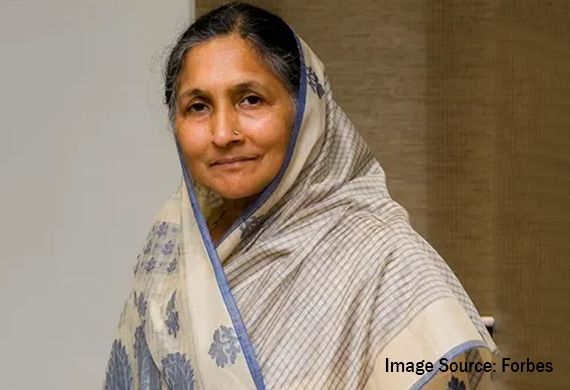
Women Business Successors - Transferring Power in the Family Businesses
By: WE STAFF | Monday, 28 September 2020
‘Never underestimate the power of a woman’, the aforementioned sentence is not merely a quote, it is actually a fact that everyone should believe, understand and follow. Things have changed, we are post the days when our society was dominated by males; now it’s different, in contemporary times, women are breaking the trend and coming out of the shadows in an all-powerful avatar. In the past couple of decades, the status of women in Indian society has changed drastically. Indian women have come a long way from being just a homemaker to business, inventions, and leading new ideas. Not just that, but women are now taking charges of their family business. While earlier sons were the heir-apparent of the family business, the trend is gradually changing. Today, women are increasingly taking over the reins of businesses that their fathers and earlier generations set up, taking them to newer heights. But, what they achieve costs a lot to them. Indeed it’s their talent and hard work that leads them to the success, however, what others are unable to see is the path of struggle, which they have to cross in order to reach their destiny. Here are some instances:
Story of struggle
Valli Arunachalam’s fight to find a space in the all-male board of her 119-year-old family business is a reminder of the struggles, women continue to face in the corporate world and the widespread gender bias that continues to haunt the Indian workplace. A nuclear scientist, with ample work experience and education, Valli wants a board seat on Ambadi Investments Ltd (AIL), the holding company of Chennai-based $5.7 billion Murugappa Group, of which her late father M.V. Murugappan was the executive chairperson. The 59-year-old alleges the members of her family “cannot tolerate women in their boardrooms,” which is why they have appointed a 23-year-old male heir to the board, she claims.
The question of qualification often comes up as a big issue, with some families still believing that women may not be capable enough. In 2013, for instance, Madhu Kapur fought a legal battle with her brother-in-law and Co-Founder of Yes Bank Rana Kapoor to get a say in the nomination of her daughter Shagun Gogia for a board seat. Besides wanting to assert her rights as a legal heir to the business, Madhu also proved that her daughter was qualified enough to take a board position. The Bombay High Court passed the judgment in her favor two years later.
Success story
When Akshali Shah decided to join Parag Milk Foods, she knew that there would be no short-cuts. That she was the daughter of the Founder-Chairman of the company - makers of Gowardhan, Topp Up, Pride of Cows and Go Cheese - did not make things any easier for her. She had to go through the grind as any other employee. After obtaining an MBA in Family-Managed Business from SP Jain University, Mumbai, she joined the company as a management trainee. However, started as a dairy by Devendra Shah, Parag Milk Foods is now a pan-India brand. Akshali can claim a significant share of the credit in increasing its popularity in recent years. Under her supervision, the company has successfully positioned Gowardhan Ghee as the power food, changing its focus from festive to round-the-year consumption interest.
There are other success stories, few of which are of Tanya & Nisaba Godrej of Godrej group, the Reddy sisters of Apollo Hospital, the Paul sisters of Apeejay Surendra Group, Laxmi Venu of Tafe and TVS, and many of these women taking over are not because there are no sons to take over the family business. They are getting involved even when there are male inheritors in the business. A lot of the change has been driven by a higher emphasis in society on woman empowerment. Yet, successful daughters in a family business are still somewhat a rarity.
According to a 2018 study by Thomas Schmidheiny Centre for Family Enterprise at the Indian School of Business, the number of women directors had gone up from 4.9 percent in 2013 to 14.3 percent in 2017. This steady rise could be as the result of the strict implementation of the Companies Act (2013), which mandates listed companies to have at least one woman director on its board. In fact, the number of women directors was 15.2 percent (2017) in standalone family firms, as compared to 13.7 percent (2017) in family business group affiliated firms.
What should be done?
So what can be done to diminish the ideology of this patriarchy system? People, especially business heads have to take some strict measures such as implementing and spreading gender equality starting from their own home. Our views on gender roles are largely based on the roles we encounter in our family, society and media. It helps to have a home where women have respect, an equal say in decisions and an opportunity to follow their passions. It is also important to give opportunities to the girl successors as well. Making a business female-friendly and giving equal opportunity will automatically improve diversity. Implementing safety and security, having strongly enforced sexual harassment policies, and fair maternity leave, are some of the steps that can truly act as a catalyst to help the organization become female-friendly.
Conclusion
The world is changing and so should we. The reality is, societies that empower women to participate fully in civic and economic life are more prosperous and peaceful. Various studies claim that women in management help raise company performance. A BCG study claims that if women and men participated equally as entrepreneurs, the global GDP would rise by around three to six percent. Hence, India needs more women in business than it needs flashy weddings.






